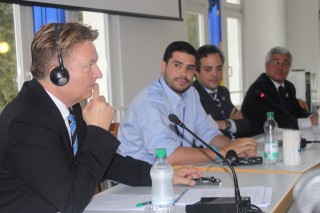Business Forum
 Vallendar. One can complain the globalization and the — or one can try to do something about it. at the forum “XXXX” there are some ideas of the Schoenstatt movement that might help in business. Eduardo Jurado, a business professor from Ecuador, is beginning to delineate the status quo “the open distrust of the media since the beginning of the banking crisis, the economic system and the government . The consequence: a dwindling National spirit.” This is something that makes the media, business and the State even weaker. Jurado quotes Pope Francis: “ Economical progress is not compulsory to achieve personal progress. Even if business was steady.”
Vallendar. One can complain the globalization and the — or one can try to do something about it. at the forum “XXXX” there are some ideas of the Schoenstatt movement that might help in business. Eduardo Jurado, a business professor from Ecuador, is beginning to delineate the status quo “the open distrust of the media since the beginning of the banking crisis, the economic system and the government . The consequence: a dwindling National spirit.” This is something that makes the media, business and the State even weaker. Jurado quotes Pope Francis: “ Economical progress is not compulsory to achieve personal progress. Even if business was steady.”
"I advocate for the market economics,” says Jurado, “ but it must be balanced by a State that looks after its people.” Otherwise it leaves a hole for tyranny of the government and a globalization that sees everything as for sale. Everything being for sale (even morality) would further damage the economy.
Jurado claims that there must be a generation contract between those who have just died and those who still live and our unborn children. It is important to be aware of our responsibility, that we pay attention to the interests of the entire world. "To restart the growth of the consumers is hard.”, says Jurado. In the past one would have looked at the world’s stock markets, one would have seen people. Now we only look at the numbers. “A stock broker pays no attention to the people anymore.” Common virtues — like solidarity and empathy can’t progress this way.
Jurado cites Father Josef Kentenich, the founder of the Schoenstatt movement: “We need to pay attention to the social allowances of the time and fight together against adversity in our society.” The social spirit must be cared for — curtesy, sympathy for the week — and the search for self and fighting against egomania.
Jurado cites Kentenich’s definition of social holiness: Catholic ideals must be the center point of economic life. Schoenstatt has the job, not just to look for the religious answers to our economic problems, but also so solve societal questions.
Lothar Ruf, an academic at the college of Darmstadt and a member of Schoenstatt takes these thoughts into account in his ideas: He proposes a model, that is modeled on the leadership system of Schoenstatt to lead the market.
The first lesson is trust: the workers should be able to trust their boss. That is why the managers of the world need to know as much as possible about what they are managing.
The second lesson is engagement. The workers and the boss should bind together. When the workers receive a fair wage, then the management can earn their pay.
The third lesson freedom: Don’t over regulate the corporations. Regulate them only as much as is absolutely needed.
The fourth is a lesson in idealism. The boss should put the workers in places where their talents are best used.
Ruf claims that Schoenstatt should stand up, and become more active in the mix.
Alan Cabello (USA) is training his eyes on a point further down the road in the business world: the work-life-balance. His studies have led him to understand, that many corporations sadly do not give enough time to the workers to have their families. Thus, his finding is that the christian movement should advocate for better social awareness. "Schoenstatt is responsible for that advocation,” said Cabello.
